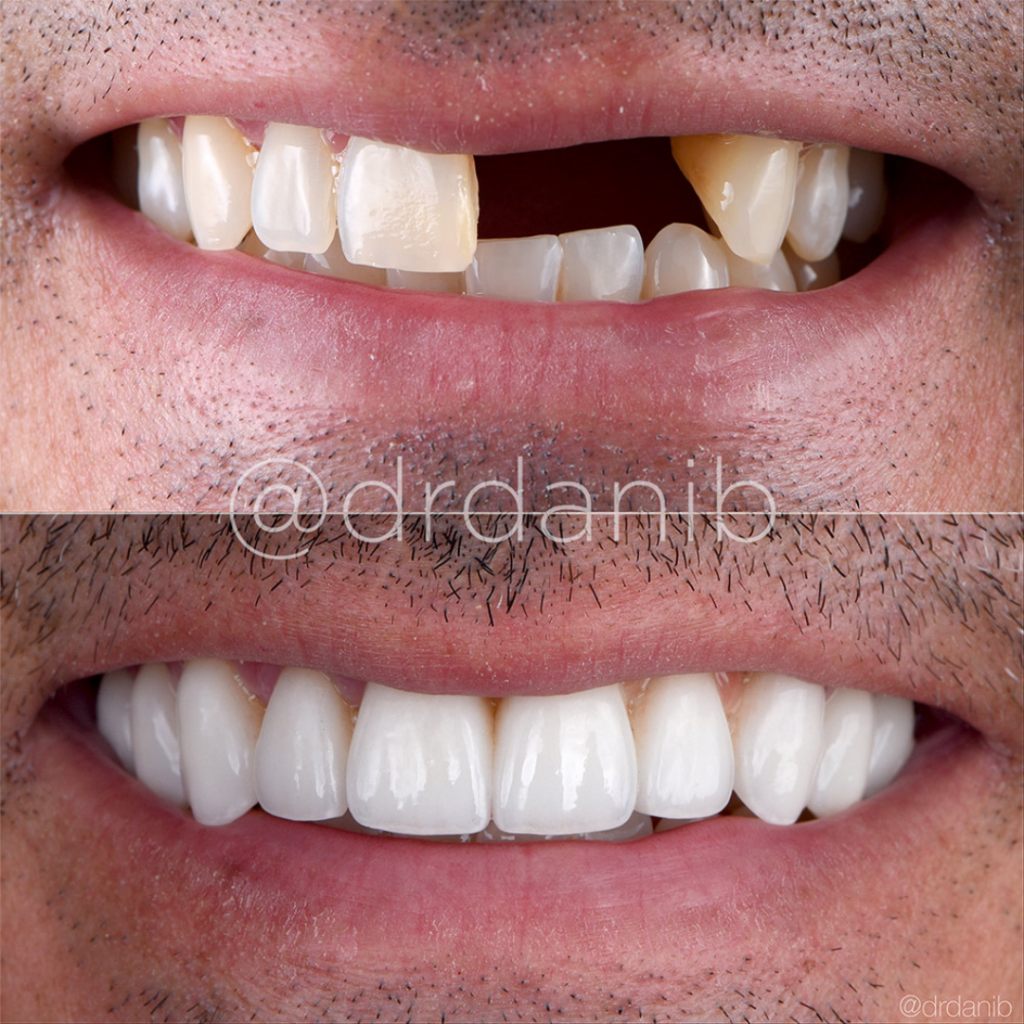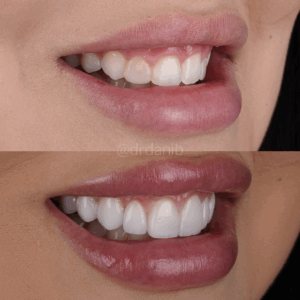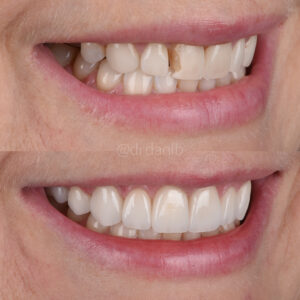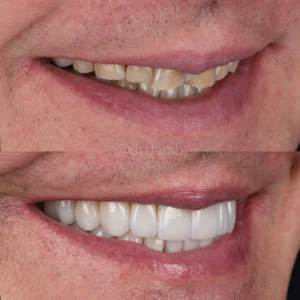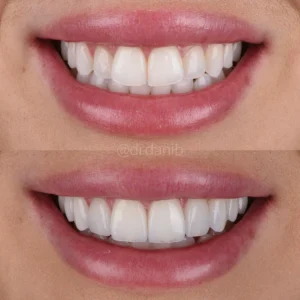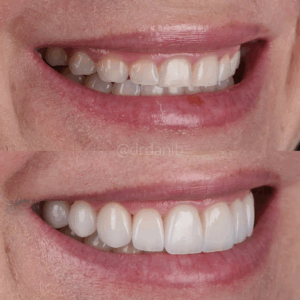A radiant smile not only boosts confidence but also plays an important role in your overall health and well-being. However, severe tooth loss, decay, or injury can significantly impact your oral function and aesthetics. Fortunately, modern dentistry offers transformative solutions, and full mouth restoration with dental implants stands out as a leading option. This approach aims to restore your smile’s function, aesthetics, and health, providing a long-lasting and natural-looking solution.
Dr. Dani B. offers various dental implant solutions for full mouth restoration, customized to individual needs. These solutions might include implant-supported bridges or dentures, providing a secure and natural-looking replacement for missing teeth.
What is a Full Mouth Restoration?
Full mouth restoration, also known as full mouth reconstruction, is a comprehensive dental treatment designed to rebuild or replace all of the teeth in both the upper and lower jaws. It addresses a range of complex dental issues, including:
- Severe tooth loss (edentulism): Losing multiple or all teeth can severely impact chewing, speech, and facial structure.
- Extensive tooth decay: When decay is widespread and beyond repair, full restoration becomes necessary.
- Advanced gum disease: Periodontal disease can lead to bone loss and tooth instability, requiring comprehensive treatment.
- Trauma or injury: Accidents or injuries can result in significant tooth damage or loss.
- Significant bite and alignment issues: Problems with bite alignment can cause pain, discomfort, and further dental complications.
How Dental Implants Work for Full Mouth Restoration
Dental implants have changed restorative dentistry. These titanium posts act as artificial tooth roots, surgically placed into the jawbone. Through a process called osseointegration, the implants fuse with the bone, creating a stable and durable foundation for prosthetic teeth.
Benefits of Full Mouth Restoration With Dental Implants
Choosing dental implants for full mouth restoration offers a wealth of advantages that go beyond simply replacing missing teeth.
Improved Chewing Ability and Speech Clarity
- Enhanced Nutritional Intake: When you lose teeth, your ability to chew effectively diminishes, leading to dietary restrictions and nutritional deficiencies. Dental implants, being firmly anchored in the jawbone, restore the biting force close to that of natural teeth. This allows you to enjoy a wider variety of foods, including those that require significant chewing, such as steak, nuts, and fresh produce.
- Clear and Confident Speech: Missing teeth, especially in the front, can cause speech impediments like lisps or slurring. Implant-supported prosthetics fill these gaps, restoring the proper tongue placement and airflow necessary for clear articulation. This enhances your confidence in social and professional settings.
- Restored Bite Force: Dentures that are not supported by implants reduce the bite force. Implants restore a majority of your natural bite force, so you can enjoy your favorite foods again.
Natural Appearance and Aesthetics
- Lifelike Prosthetics: Modern dental technology allows for the creation of implant-supported prosthetics that are virtually indistinguishable from natural teeth. The materials used, such as porcelain or zirconia, mimic the translucency and texture of enamel.
- Customized Smile Design: Implant specialists like Dr. Dani B. work closely with patients to design a smile that complements their facial features and personal preferences. This includes selecting the appropriate shape, size, and shade of the prosthetic teeth.
- Facial Harmony: By restoring the vertical dimension of the face (the distance between the upper and lower jaws), implants help to create a more youthful and balanced facial appearance.
Long-Term Durability Compared to Traditional Dentures
- Permanent Solution: Dental implants, when properly cared for, can last a lifetime. The titanium posts fuse with the jawbone, creating a permanent and stable foundation.
- Reduced Maintenance: Unlike removable dentures, which require daily cleaning and periodic adjustments, implant-supported prosthetics are cleaned like natural teeth.
- Resilience: Implants are highly resistant to wear and tear, providing long-term functionality and stability. Traditional dentures require replacements every 5-10 years on average.
Prevention of Bone Loss and Facial Sagging
- Stimulation of the Jawbone: Natural teeth stimulate the jawbone through chewing, which is essential for maintaining bone density. When teeth are lost, this stimulation ceases, leading to bone resorption.
- Preservation of Facial Structure: Bone loss in the jaw can cause the face to appear sunken or aged. Dental implants prevent this bone loss, preserving facial structure and preventing premature aging.
- Support of Facial Muscles: The bone preservation that implants provide, also helps to support the muscles of the face. This added support, reduces the appearance of wrinkles, and sagging skin.
Comfort and Convenience
- Secure Fit: Implant-supported prosthetics are securely anchored in the jawbone, eliminating the slipping, shifting, and discomfort associated with traditional dentures.
- No Adhesives Required: Unlike dentures that rely on adhesives for retention, implants provide a stable and comfortable fit without the need for messy glues or pastes.
- Natural Feel: Implants feel and function like natural teeth, allowing you to eat, speak, and smile with confidence and comfort.
- Increased Confidence: The secure fit, and natural feeling of the implants, gives the patient a large boost in confidence. They no longer have to worry about their dentures slipping, or falling out.
Also Read: Should You Consider Dental Implants? Here’s What You Need to Know
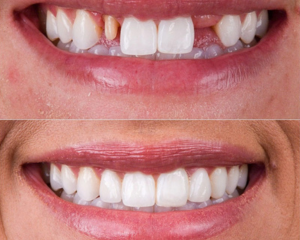
The Full Mouth Restoration Process with Implants
Initial consultation and evaluation
Dr. Dani B. will conduct a thorough examination, including dental X-rays and 3D imaging, to assess your oral health and determine your suitability for implants. Bone density is an important factor, and treatment options and costs will be discussed.
Bone grafting (if needed)
If your jawbone lacks sufficient density, bone grafting may be necessary. This procedure involves adding bone material to strengthen the jawbone, creating a stable foundation for implants. Healing time varies depending on the type of graft.
Implant placement procedure
During a minor surgical procedure, the titanium implants are carefully placed into the jawbone. The healing period, typically 3-6 months, allows for osseointegration.
Attaching the prosthetic teeth
Once the implants have fully integrated, custom-made dental bridges or implant-supported dentures are attached. Adjustments are made to ensure a proper bite and comfortable fit.
Who Is a Good Candidate for Full Mouth Restoration with Dental Implants?
Ideal candidates for full mouth restoration with dental implants typically:
- Have good overall health.
- Possess sufficient jawbone density or are willing to undergo bone grafting.
- Are committed to maintaining excellent oral hygiene and attending regular dental visits.
However, certain factors may necessitate alternative solutions. Patients with severe uncontrolled health conditions like diabetes or heart disease, as well as heavy smokers, may face higher risks of implant failure.
Cost and Insurance Considerations
The cost of full mouth restoration with dental implants varies depending on several factors, including the number of implants required, the type of prosthetic teeth used, and any additional procedures like bone grafting or extractions. While the initial investment may seem significant, it’s important to consider the long-term benefits and durability compared to traditional dentures. Some insurance plans may offer partial coverage, and financing options are often available.
Recovery and Aftercare
Following the implant placement procedure, you can expect some swelling and discomfort, which can be managed with medication. Proper oral hygiene is important for successful healing and long-term implant success. Regular dental check-ups are necessary for maintaining your implants and ensuring optimal oral health.
Conclusion
Full mouth restoration with dental implants is a transformative solution that can dramatically improve your quality of life. By restoring function, aesthetics, and oral health, implants provide a durable and natural-looking smile. If you’re considering full mouth restoration, consulting a qualified dentist like Dr. Dani B. is the first step towards achieving a healthier, more confident smile.
Contact Dr. Dani B. today to explore your options!


